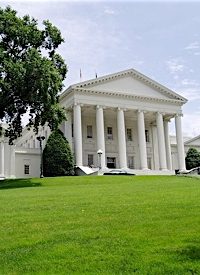
In a stark illustration of the economic fears still plaguing America, a resolution was introduced in the Virginia legislature on January 12 that would create a subcommittee to officially consider the adoption of an alternative currency in case of a total breakdown of the U.S. dollar and the Federal Reserve System.
If the dollar loses its status as the world reserve currency, which appears increasingly likely, the U.S. economy will suffer devastating consequences caused by the resulting hyperinflation — especially since America imports most of its oil. And with the world’s most prominent international institutions and leaders predicting and even calling for an end to dollar hegemony, as well as the creation of a world currency controlled by a global central bank, the time for states to take notice and prepare may be now or never.
The Virginia resolution, introduced by Republican Delegate Robert Marshall, begins with the premise that the state government has a responsibility to protect the lives and property of its citizens. To fulfill that mission requires proper state finances and a “robust private economy,” both of which necessitate a “sound currency.”
And according to the bill, the current monetary and banking systems — revolving around the Federal Reserve — might not be able to provide the stability necessary for a prosperous economy and well-functioning state government. Not for long, at least. The present systems “have come under ever-increasing strain during the last several years, and will be exposed to ever-increasing and predictably debilitating strain in the years to come.”
On top of that, the legislation points out, many prominent authorities are predicting the “inevitable destruction of the Federal Reserve System’s currency through hyperinflation in the foreseeable future.” So if and when the widely anticipated monetary calamity arrives, without prior preparations, the state’s finances and the private sector would be “thrown into chaos.”
Of course, such a scenario would have “gravely detrimental effects upon the lives, health, and property of Virginia’s citizens, and with consequences fatal to the preservation of good order,” the resolution warns. And those effects can only be avoided or minimized with the rapid adoption of an alternative sound currency, according to the proposal.
The bill also notes, citing experts, that the dollar’s lack of precious-metals backing is one of the major reasons — if not the primary one — for the central banking system’s ever-worsening instability. It also explains that the U.S. Constitution forces all states to make gold and silver a tender in payment of debts, even citing a Supreme Court ruling which recognizes that states may use whatever currency they choose in performing their sovereign functions — despite the fact that Congress decreed Federal Reserve Notes to be “legal tender.”
The alternative currency, if adopted, would not lead to a ban on the use of Federal Reserve Notes — it would merely provide another option, sparking desirable competition without further destabilizing the current fiat-money regime. But as the bill points out, “the United States Congress, the U.S. Department of the Treasury, and the Federal Reserve System have taken and are preparing to take no action to provide the United States with an alternative to the Federal Reserve System’s currency, in the likely event that the latter would be destroyed through hyperinflation.”
Since Virginia legislators know or should know all of this already, and because the state has the ability and the duty to do something about the situation — even without approval from Congress — “the citizens of the Commonwealth will properly conclude that the members of the General Assembly will be primarily responsible if the Commonwealth is found to be without an alternative currency when the Federal Reserve System’s currency collapses in hyperinflation, or some other related economic calamity supervenes,” the bill warns.
Of course, legislators in Virginia are not alone in their concerns about the dollar. “Proposals for states and their citizens to adopt an alternative currency consisting of gold or silver, or both, are receiving increasing attention throughout the United States, as evidenced by bills that have been or are being introduced in the legislatures of the States of Georgia, Indiana, Montana, New Hampshire, and South Carolina,” the proposal explains, highlighting the fact that precious metals have already proven themselves in the free market.
The resolution would not in itself create an alternative currency. It would merely create a bipartisan committee to examine the issue and make recommendations for legislation to deal with it. The group’s findings and suggestions would be due by next year. The bill is summarized on the Commonwealth’s website as a resolution “Establishing a joint subcommittee to study whether the Commonwealth should adopt a currency to serve as an alternative to the currency distributed by the Federal Reserve System in the event of a major breakdown of the Federal Reserve System.”
Numerous constitutional and monetary experts have recommended state policies to deal with the issue — especially since the federal government has so far refused to address the looming crisis. Attorney Edwin Vieira, for example, a prominent constitutional scholar, told The New American last year that it would be very wise for state governments to start preparing for major problems in the dollar. One suggestion he offered would see states start accepting part of their tax revenues in precious metals — a proposal which could be ramped up if times required it.
Of course, the inherent problems with the current monetary system have not gone unnoticed in Congress, either. Rep. Ron Paul has been sounding the alarm for decades, culminating in a recent book entitled End the Fed and a bill to audit the Federal Reserve that — despite being watered down — succeeded in exposing certain central-bank dealings. He also has a bill that would repeal legal tender rules and allow the free market to decide what should be used as money. And recently, his proposals and the ideas he espouses have been getting a lot more attention — as evidenced by the resolution introduced in Virginia.
But despite Virginia Gov. Bob McDonnell announcing that he won’t support the measure, analysts are hailing just the bill’s introduction as a significant step. Gold Stock Bull founder Jason Hamlin, for example, said the proposal “could be the financial shot heard around the world” in a piece for The Market Oracle.
Financial website ZeroHedge.com suggested the resolution “may one day be heralded as the formal proposal that proverbially started it all.” Urging all legislators to carefully read the legislation, the site commented: “Whether this resolution will ever get off the ground, and actually find that the world is at great risk should gold not be instituted as a backstop currency, is irrelevant. The mere fact that it is out there, should provide sufficient impetus to other states to consider the ultimate Plan B.”
Similarly, GoldAlert.com, citing recent news of foreign governments considering transactions in gold, suggested “Virginia’s move could be the start of a growing trend around the world of various levels of government seeking to transact in a currency that is no individual’s debt and cannot be printed at the whim of central bankers.”
For now, the resolution has been referred to the Committee on Rules. How far it will go remains to be seen. But with other states considering similar measures and the dollar’s problems becoming increasingly obvious, prudent preparations for a potential catastrophe will only continue building steam.
Photo: The Virginia State Capitol is home to the Virginia General Assembly.



